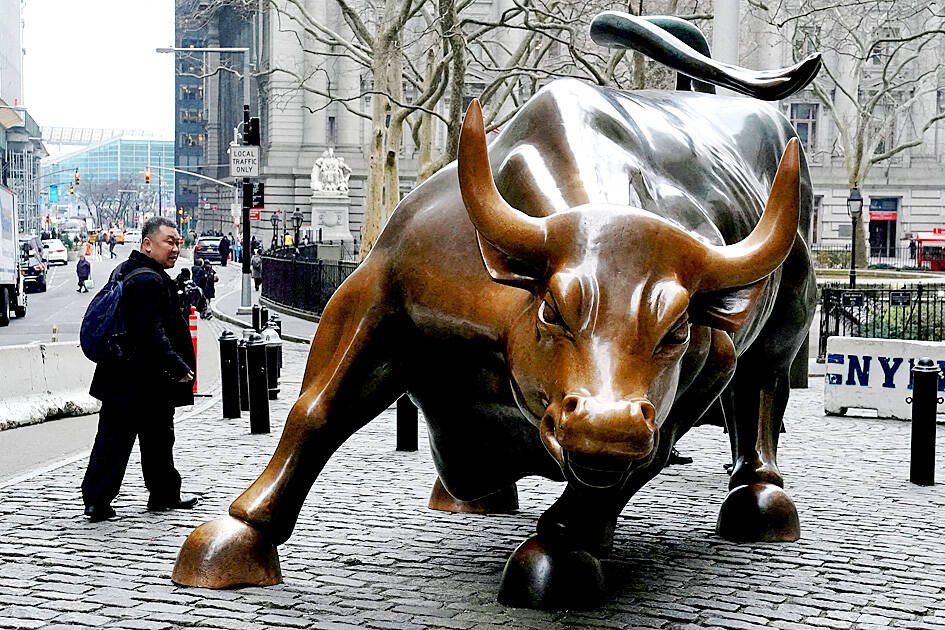Taiwanese financial holding companies increased their overall overseas exposure — including lending, investments and interbank transactions — to NT$27.38 trillion (US$845.69 billion) in the first quarter, data compiled by the Financial Supervisory Commission showed yesterday.
The 15 financial holding companies’ overall exposure in overseas markets at the end of March rose by NT$1.03 trillion from NT$26.35 trillion at the end of last year, as the firms increased overseas lending and beefed up their overseas investments, the commission said.
It said that first-quarter exposure was the highest in 36 quarters since such data started to be released in the second quarter of 2015.

Photo: Reuters
Financial holding companies’ top 10 markets for overseas exposure remained the same in the first quarter as the previous quarter. They were, in descending order: the US, China, the UK, France, Australia, South Korea, Hong Kong, Japan, Canada and the United Arab Emirates, the commission’s data showed.
In the first quarter, the companies raised their US exposure by NT$464.59 billion to NT$9.6 trillion, as they increased their investments in that market, the commission said.
Overall, their US exposure accounted for 35.08 percent of total overseas exposure, hitting a new high, it said.
The companies also saw their exposure to China rise to NT$2.21 trillion at the end of March, up from NT$2.19 trillion at the end of last year, as a decline in investment in China was offset by increases in lending and interbank transactions there, the commission said.
However, the ratio of their exposure to China compared with all overseas exposure dropped from 8.33 percent to 8.07 percent, an all-time low, it said.
Financial holding companies’ combined exposures to the UK, France, Australia, South Korea and Hong Kong were each above NT$1 trillion last quarter, while their combined exposure to Japan had been accelerating over the past few quarters and hit NT$987.63 billion at the end of March, the commission’s data showed.
The increase in exposure to Japan indicated a shift in companies’ appetite for the East Asian market following Taiwan Semiconductor Manufacturing Co’s (TSMC, 台積電) launch of new wafer fabs early this year, the commission said.
TSMC expanding its footprint in Japan has prompted several Taiwanese banks, including E.Sun Commercial Bank (玉山銀行), Taishin International Bank (台新銀行) and Bank of Taiwan (臺灣銀行) to set up new branches or representative offices in Japan, the commission said.
Compared with the first quarter of last year, financial holding companies’ overall exposure to the US at the end of March increased the most year-on-year, by NT$1.12 trillion, followed by an increase of NT$169.12 billion in exposure to Australia and NT$129.89 billion to South Korea, it said.

Taiwan’s long-term economic competitiveness will hinge not only on national champions like Taiwan Semiconductor Manufacturing Co. (TSMC, 台積電) but also on the widespread adoption of artificial intelligence (AI) and other emerging technologies, a US-based scholar has said. At a lecture in Taipei on Tuesday, Jeffrey Ding, assistant professor of political science at the George Washington University and author of "Technology and the Rise of Great Powers," argued that historical experience shows that general-purpose technologies (GPTs) — such as electricity, computers and now AI — shape long-term economic advantages through their diffusion across the broader economy. "What really matters is not who pioneers

In a high-security Shenzhen laboratory, Chinese scientists have built what Washington has spent years trying to prevent: a prototype of a machine capable of producing the cutting-edge semiconductor chips that power artificial intelligence (AI), smartphones and weapons central to Western military dominance, Reuters has learned. Completed early this year and undergoing testing, the prototype fills nearly an entire factory floor. It was built by a team of former engineers from Dutch semiconductor giant ASML who reverse-engineered the company’s extreme ultraviolet lithography (EUV) machines, according to two people with knowledge of the project. EUV machines sit at the heart of a technological Cold

TAIWAN VALUE CHAIN: Foxtron is to fully own Luxgen following the transaction and it plans to launch a new electric model, the Foxtron Bria, in Taiwan next year Yulon Motor Co (裕隆汽車) yesterday said that its board of directors approved the disposal of its electric vehicle (EV) unit, Luxgen Motor Co (納智捷汽車), to Foxtron Vehicle Technologies Co (鴻華先進) for NT$787.6 million (US$24.98 million). Foxtron, a half-half joint venture between Yulon affiliate Hua-Chuang Automobile Information Technical Center Co (華創車電) and Hon Hai Precision Industry Co (鴻海精密), expects to wrap up the deal in the first quarter of next year. Foxtron would fully own Luxgen following the transaction, including five car distributing companies, outlets and all employees. The deal is subject to the approval of the Fair Trade Commission, Foxtron said. “Foxtron will be

INFLATION CONSIDERATION: The BOJ governor said that it would ‘keep making appropriate decisions’ and would adjust depending on the economy and prices The Bank of Japan (BOJ) yesterday raised its benchmark interest rate to the highest in 30 years and said more increases are in the pipeline if conditions allow, in a sign of growing conviction that it can attain the stable inflation target it has pursued for more than a decade. Bank of Japan Governor Kazuo Ueda’s policy board increased the rate by 0.2 percentage points to 0.75 percent, in a unanimous decision, the bank said in a statement. The central bank cited the rising likelihood of its economic outlook being realized. The rate change was expected by all 50 economists surveyed by Bloomberg. The